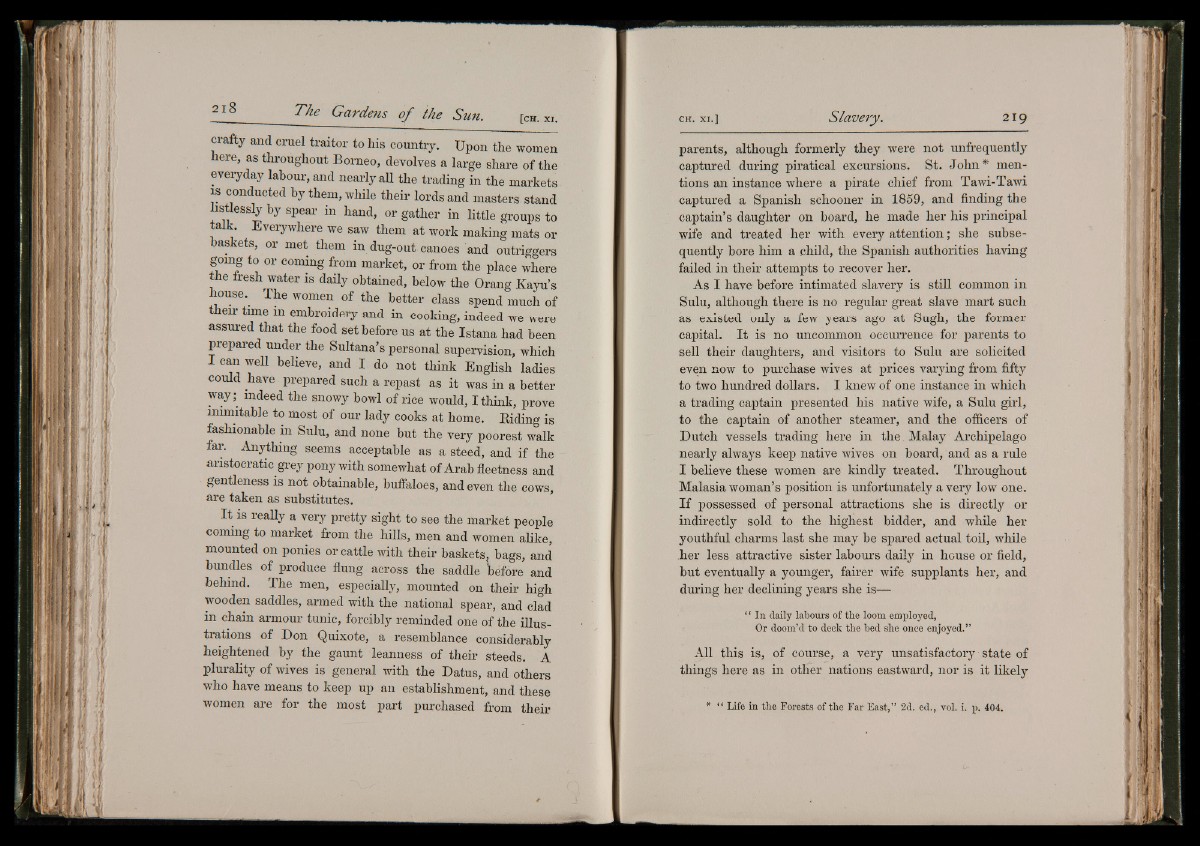
crafty and cruel traitor to his country. Upon the women
here, as throughout Borneo, devolves a large share of the
everyday labour, and nearly all the trading in the markets
is conducted by them, while their lords and masters stand
listlessly by spear in hand, or gather in littie groups to
talk. Everywhere we saw them at work making mats or
baskets, or met them in dug-out canoes and outriggers
going to or coming from market, or from the place where
the fresh water is daily obtained, below the Orang Kayu’s
house. The women of the better class spend much of
their time m embroidery and in cooking, indeed we were
assured that the food set before us at the Istana had been
prepared under the Sultana’s personal supervision, which
I can weU believe, and I do not think English ladies
could have prepared such a repast as it was in a better
way; indeed the snowy bowl of rice would, I think, prove
inimitable to most of our lady cooks at home. Biding is
fashionable in Sulu, and none but the very poorest walk
far. Anything seems acceptable as a steed, and if the
aristocratic grey pony with somewhat of Arab fleetness and
gentleness is not obtainable, buffaloes, and even the cows,
are taken as substitutes.
It is really a very pretty sight to see the market people
coming to market from the hills, men and women alike,
mounted on ponies or cattle with their baskets, bags, and
bundles of produce flung across the saddle before and
behind. The men, especially, mounted on their high
wooden saddles, armed with the national spear, and clad
in chain armour tunic, forcibly reminded one of the illustrations
of Don Quixote, a resemblance considerably
heightened by the gaunt leanness of their steeds. A
plurality of wives is general with the Datus, and others
who have means to keep up an establishment, and these
women are for the most part purchased from their
parents, although formerly they were not unfrequently
captured during piratical excursions. St. John* mentions
an instance where a pirate chief from Tawi-Tawi
captured a Spanish schooner in 1859, and finding the
captain’s daughter on board, he made her his principal
wife and treated her with every attention; she subsequently
bore him a child, the Spanish authorities having
failed in their attempts to recover her.
As I have before intimated slavery is still common in
Sulu, although there is no regular great slave mart such
as existed only a few years ago at Sugh, the former
capital. It is no uncommon occurrence for parents to
sell their daughters, and visitors to Sulu are solicited
even now to purchase wives at prices varying from fifty
to two hundred dollars. I knew of one instance in which
a trading captain presented his native wife, a Sulu girl,
to the captain of another steamer, and the officers of
Dutch vessels trading here in the. Malay Archipelago
nearly always keep native wives on board, and as a rule
I believe these women are kindly treated. Throughout
Malasia woman’s position is unfortunately a very low one.
I f possessed of personal attractions she is directly or
indirectly sold to the highest bidder, and while her
youthful charms last she may be spared actual toil, while
her less attractive sister labours daily in house or field,
but eventually a younger, fairer wife supplants her, and
during her declining years she is—
“ In daily labours of the loom employed,
Or doom’d to deck the bed she once enjoyed.”
All this is, of course, a very unsatisfactory state of
things here as in other nations eastward, nor is it likely
* “ Life in the Forests of the Far East,” 2d. ed., vol. i. p. 404.